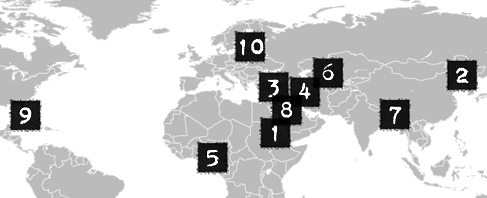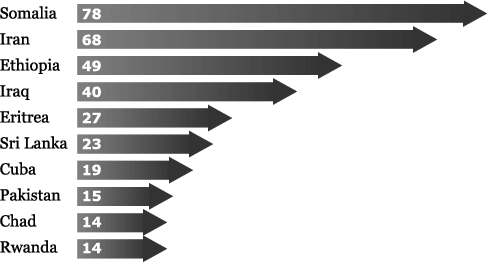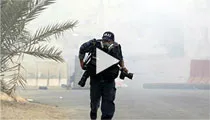Press freedom remained in a deep freeze under authoritarian leader Islam Karimov. The authorities continued to imprison critical journalists on lengthy terms. Muhammad Bekjanov, one of the two longest-imprisoned journalists in the world, was sentenced to an additional prison term just days before his scheduled release. The handful of independent journalists in the country faced politicized prosecution, censorship, and other forms of repression. The authorities permitted minimal Western media presence. A BBC journalist who broke a story on forced sterilization of Uzbek women was barred from entering the country in February. The authorities continued their practice of hiring “experts” to build fabricated criminal cases against journalists on charges ranging from national defamation to extremism. Using that tactic, prosecutors filed criminal cases against two independent reporters in 2012. The government’s vast censorship practices earned it a place on CPJ’s 10 Most Censored Countries list, published in May. The authorities aggressively expanded censorship during the year: The state communications agency was told to block websites deemed “threatening to the nation’s information space”; the education ministry barred college students from visiting Internet cafés; and the government raided and seized control of the local branch of the Russian telecommunications company, MTS, causing up to 10 million Uzbeks to lose mobile Internet and phone access. In a July documentary, a state-owned broadcaster called online activism a weapon worse than bombs.
Uzbekistan
» Repressive tactics include politicized prosecutions and lengthy prison terms.
» Authorities expand online control in one of the world’s most censored nations.
Press freedom remained in a deep freeze under authoritarian leader Islam Karimov. The authorities continued to imprison critical journalists on lengthy terms. Muhammad Bekjanov, one of the two longest-imprisoned journalists in the world, was sentenced to an additional prison term just days before his scheduled release. The handful of independent journalists in the country faced politicized prosecution, censorship, and other forms of repression. The authorities permitted minimal Western media presence. A BBC journalist who broke a story on forced sterilization of Uzbek women was barred from entering the country in February. The authorities continued their practice of hiring “experts” to build fabricated criminal cases against journalists on charges ranging from national defamation to extremism. Using that tactic, prosecutors filed criminal cases against two independent reporters in 2012. The government’s vast censorship practices earned it a place on CPJ’s 10 Most Censored Countries list, published in May. The authorities aggressively expanded censorship during the year: The state communications agency was told to block websites deemed “threatening to the nation’s information space”; the education ministry barred college students from visiting Internet cafés; and the government raided and seized control of the local branch of the Russian telecommunications company, MTS, causing up to 10 million Uzbeks to lose mobile Internet and phone access. In a July documentary, a state-owned broadcaster called online activism a weapon worse than bombs.
No independent media outlets are based in Uzbekistan, earning the nation a place on CPJ's 10 Most Censored Countries list. Independent journalists—mostly contributors to outlets outside the country—are subject to interrogation and prosecution under defamation charges or outdated statutes such as "insulting national traditions."

| 1. Eritrea 2. North Korea 3. Syria | 4. Iran 5. Equatorial Guinea 6. Uzbekistan | 7. Burma 8. Saudi Arabia 9. Cuba | 10. Belarus |
Bekjanov, editor of the opposition newspaper Erk, and Yusuf Ruzimuradov, a reporter for the paper, are the longest-imprisoned journalists in the world, according to CPJ research. Convicted in 1999 on charges of publishing a banned newspaper, the two have been tortured while in custody, according to news accounts and reports from human rights defenders. Just before Bekjanov was scheduled to be released in January 2012, the authorities sentenced him to an additional five years in prison for allegedly violating unspecified prison rules.
19 | Years for Bekjanov, imposed in 1999, with an additional sentence in 2012 |
15 | Years for Ruzimuradov, imposed in 1999 |
12.5 | Years for Dilmurod Saiid, imposed in 2009 |
10 | Years for Salidzhon Abdurakhmanov, imposed in 2008 |
Independent journalists Elena Bondar and Viktor Krymzalov faced criminal prosecutions built by government-hired "experts," regional media reported. The journalists were charged on separate counts of mass disorder and insult that the "experts" reported finding in the commentaries published online. The reporters denied writing the pieces, but the courts convicted both, fining Bondar 6.3 million som (US$3,240) and Krymzalov 3.8 million som (US$1,950).
February 2010
Umida Akhmedova, a photojournalist and filmmaker, is convicted of insulting the Uzbek nation through a 2007 photo album on rural life and a 2008 documentary on the traditional ban on premarital sex.October 2010
Abdumalik Boboyev, Voice of America's Uzbek service stringer, is convicted of insulting the Uzbek people based on the experts' review of his coverage of corruption, human rights, and health care system. He is fined.October 2010
Vladimir Berezovsky, a Russian editor, is convicted of insulting the Uzbek nation based on stories published on Vesti, his website. The authorities are angered by a story in which he criticized the renaming of a street that had previously honored an ethnic Russian. He is given amnesty.Journalist Elena Bondar, whose reporting was critical of the Karimov regime, went into exile in 2012. At least two other critical Uzbek journalists have also fled the country since 2007, CPJ research shows.


